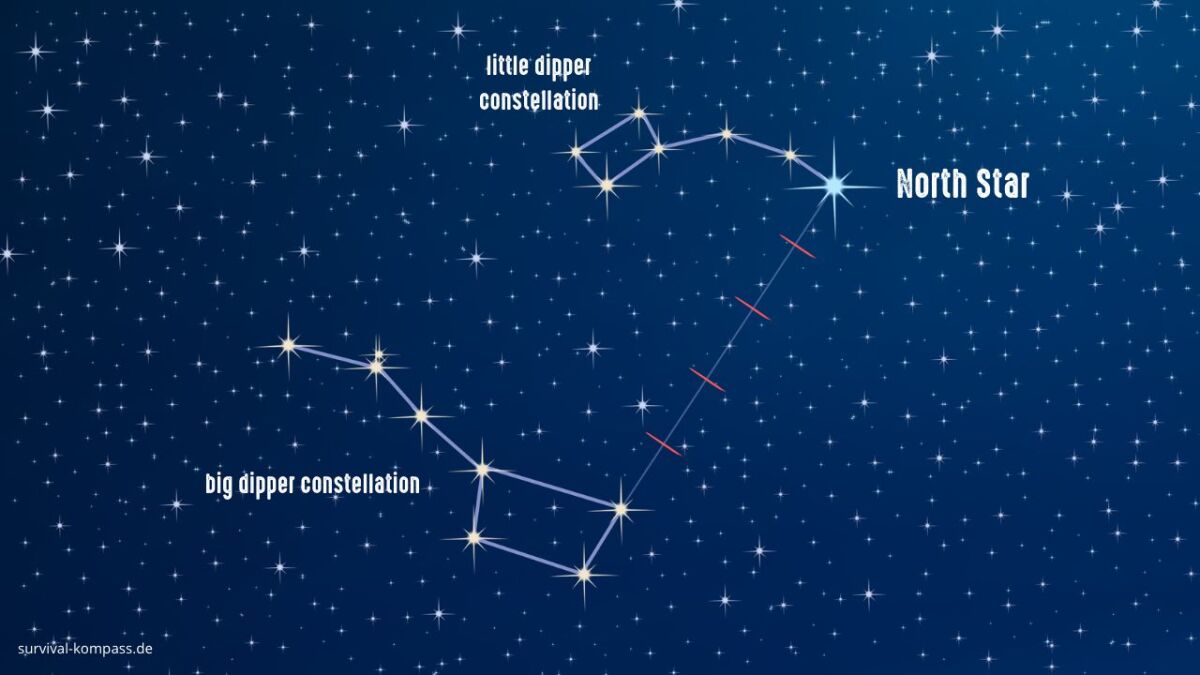
orientation
Noun
Meaning
Orientation is a crucial skill in the world of survival, bushcraft, and outdoor activities. It refers to the ability to determine one's position and navigate in unfamiliar terrain. Whether you're camping, hiking, or exploring the wilderness, having a good sense of orientation can mean the difference between getting lost and finding your way back to safety.
Knowing how to read a map, use a compass, and identify landmarks are essential for successful orientation. By understanding the surrounding environment and using various tools and techniques, you can confidently navigate through the wilderness and reach your destination.
Orientation is a fundamental aspect of outdoor adventures, ensuring your safety and enhancing your overall experience in nature.

Examples
„I love going on wilderness adventures, but sometimes it can be easy to get disoriented.“
„During my last camping trip, I relied on my compass for orientation and it helped me find my way back to camp. When you're out in the wild, it's important to have good orientation skills.“
„I learned how to read the stars and navigate using celestial bodies, which has been incredibly useful during nighttime hikes. Survival situations can be incredibly stressful, but maintaining a sense of orientation is crucial.“
„I remember being lost in the woods once, but thanks to my knowledge of natural landmarks, I was able to find my way back to civilization. In the world of bushcraft, orientation is a fundamental skill.“
„I always carry a topographic map and a compass with me, so I can navigate through unfamiliar terrain with ease. During a survival training course, we were taught various methods of orientation.“
„One technique involved using a makeshift sundial to determine the direction of the sun, which helped us stay on track during our journey.“
„I can't stress enough how important it is to have good orientation skills when venturing into the wilderness. It can mean the difference between getting lost and finding your way back home.“
Origin
The word "orientation" has its roots in the Latin word "orientare," which means "to face the east" or "to align with the rising sun." This term was originally used in reference to the positioning of buildings or objects in relation to the east-west axis. In ancient times, the east was considered a sacred direction associated with new beginnings and enlightenment.
Over time, the meaning of "orientation" expanded to include the act of determining one's position or direction in relation to their surroundings. It became particularly relevant in navigation and exploration, where knowing which way is north, south, east, or west is crucial for finding one's way.
In the context of survival and outdoor activities, orientation refers to the ability to establish one's bearings and navigate through unfamiliar terrain. It involves using various tools and techniques, such as maps, compasses, landmarks, and celestial observations, to determine one's position and plan a route.
Today, orientation is not only important for survival situations but also for everyday activities like hiking, camping, and wilderness exploration. It helps us stay on track, avoid getting lost, and make informed decisions about our surroundings.
Synonyms
Navigation, Direction, Guidance, Positioning, Orientation, Bearing, Alignment, Compass
Antonyms
Disorientation, Confusion, Bewilderment, Disarray, Misdirection, Perplexity, Uncertainty, Lost
Relatives
Compass, Map, Navigation, Direction, Landmarks, GPS, Orienteering, Wayfinding
Historical and cultural importance
Orientation is a term that holds significant historical and cultural relevance. Throughout history, humans have relied on their ability to orient themselves in order to survive and thrive in the wild. From ancient civilizations to modern explorers, understanding one's orientation in relation to their surroundings has been crucial for navigation, survival, and successful expeditions.
In ancient times, celestial navigation played a vital role in orientation. By observing the stars, early seafarers and travelers were able to determine their position and direction. This knowledge allowed them to navigate vast oceans and uncharted territories, opening up new trade routes and expanding civilizations.
Furthermore, cultural practices and traditions have also shaped the concept of orientation. Indigenous communities around the world have developed unique methods of orientation based on their deep connection with the land. These methods often involve using natural landmarks, such as mountains, rivers, or specific tree formations, to navigate and find their way.
In modern times, orientation has taken on new forms with the advent of technology. Global Positioning System (GPS) devices and compasses have become essential tools for hikers, campers, and adventurers. These tools provide precise information about one's location and direction, making outdoor activities safer and more accessible.
Overall, orientation encompasses both historical and cultural significance. It represents the human instinct to understand and navigate the world around us, whether through ancient celestial observations or modern technological advancements.
More information about the term orientation
Orientation: Finding Your Way in the Wilderness
When venturing into the wilderness, one of the most crucial skills you need to master is orientation. Being able to find your way and navigate through unfamiliar terrain is essential for your safety and survival. In this guide, I will share with you some valuable tips and techniques to help you stay on track and find your way back home.
Understanding the Basics
Before we dive into the specifics, it's important to understand the basics of orientation. The primary goal is to determine your position and the direction you need to go. This can be achieved through various methods, including using a compass, reading maps, observing natural landmarks, and utilizing the sun and stars.
Using a Compass: A compass is a reliable tool that uses the Earth's magnetic field to determine direction. By aligning the compass needle with the north, you can easily find your bearings and navigate accurately.
Reading Maps: Maps are invaluable resources that provide a visual representation of the terrain. Familiarize yourself with map symbols, contour lines, and scale to interpret the information correctly. By combining map reading with compass navigation, you can pinpoint your location and plan your route effectively.
Observing Natural Landmarks: Nature provides us with various landmarks that can serve as navigational aids. Mountains, rivers, rock formations, and distinctive trees can help you orient yourself and maintain your course.
Using the Sun and Stars: The sun rises in the east and sets in the west, providing a reliable reference point during the day. By observing the sun's position and shadows, you can determine your direction of travel. At night, the stars can guide you, with the North Star (Polaris) being a particularly useful reference point in the northern hemisphere.
Practical Tips for Orientation
Now that you understand the basics, let's explore some practical tips to enhance your orientation skills:
1. Stay Calm and Assess the Situation: If you find yourself disoriented, take a moment to calm down and assess your surroundings. Panic can cloud your judgment and lead to poor decision-making.
2. Carry Essential Navigation Tools: Always have a compass, map, and GPS device (if available) with you. These tools will be your lifeline in unfamiliar territory.
3. Study the Terrain: Before embarking on your journey, study the terrain and familiarize yourself with key landmarks and features. This will help you navigate more confidently.
4. Use Multiple Navigation Methods: Relying on a single method of navigation can be risky. Use a combination of compass, map, natural landmarks, and celestial bodies to cross-verify your position.
5. Practice Navigation Skills: Regularly practice your navigation skills in different environments and weather conditions. This will build your confidence and improve your ability to adapt to changing circumstances.
6. Trust Your Instincts: While navigation tools are essential, don't underestimate your instincts. Pay attention to your surroundings, listen to your gut feeling, and make informed decisions based on all available information.
Conclusion
Orientation is a fundamental skill for anyone venturing into the wilderness. By understanding the basics, practicing navigation techniques, and staying calm in challenging situations, you can confidently find your way and enjoy the beauty of nature while ensuring your safety and survival.
Back to overview

